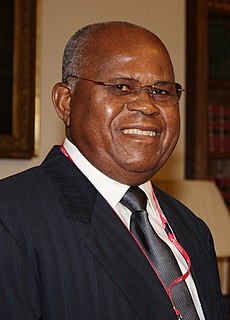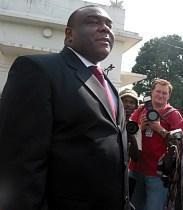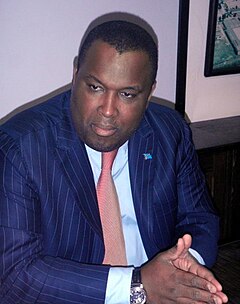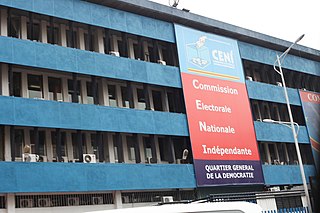Discovered in the 1990s, human remains in the Democratic Republic of the Congo have been dated to approximately 90,000 years ago. The first real states, such as the Kongo, the Lunda, the Luba and Kuba, appeared south of the equatorial forest on the savannah from the 14th century onwards.

Politics of the Democratic Republic of Congo take place in a framework of a republic in transition from a civil war to a semi-presidential republic.

The Democratic Republic of the Congo, informally Congo-Kinshasa, DR Congo, the DRC, the DROC, or the Congo, and formerly and also colloquially Zaire, is a country in Central Africa. It is, by area, the second largest country in Africa, and the 11th-largest in the world. With a population of around 92 million, the Democratic Republic of the Congo is the most populous officially Francophone country in the world. It is a member of the United Nations, Non-Aligned Movement, African Union, COMESA, and the East African Community. The capital and largest city is Kinshasa, which is also the world's most populous Francophone city.

Joseph Kabila Kabange is a Congolese politician who served as President of the Democratic Republic of the Congo between January 2001 and January 2019. He took office ten days after the assassination of his father, President Laurent-Désiré Kabila in the context of the Second Congo War. He was allowed to remain in power after the 2003 Pretoria Accord ended the war as the president of the country's new transitional government. He was elected as president in 2006 and re-elected in 2011 for a second term. Since stepping down after the 2018 election, Kabila, as a former president, serves as a senator for life.

Léon Kengo wa Dondo is a Congolese politician who served as the "first state commissioner" several times under Mobutu Sese Seko in Zaïre. He was one of the most powerful figures in the regime and was a strong advocate of economic globalization and free-market economics. He served as President of the Senate of the Democratic Republic of the Congo from 2007 to 2019.

Étienne Tshisekedi wa Mulumba was a Congolese politician and the leader of the Union for Democracy and Social Progress (UDPS), the main opposing political party in the Democratic Republic of the Congo (DRC). A long-time opposition leader, he served as Prime Minister of the country on three brief occasions: in 1991, 1992–1993, and 1997.

Jean-Pierre Bemba Gombo is a politician in the Democratic Republic of the Congo. He was one of four vice-presidents in the transitional government of the Democratic Republic of the Congo from 17 July 2003 to December 2006. Bemba also leads the Movement for the Liberation of the Congo (MLC), a rebel group turned political party. He received the second-highest number of votes in the 2006 presidential election. In January 2007 he was elected to the Senate.

François-Joseph Mobutu Nzanga Ngbangawe is a Congolese politician. A son of the long-time President Mobutu Sese Seko, he served in the government of the Democratic Republic of the Congo under President Joseph Kabila from 2007 to 2011, initially as Minister of State for Agriculture and subsequently as Deputy Prime Minister for Basic Social Needs. He was dismissed from the government in March 2011. In 2008, he founded the Union of Mobutist Democrats as the successor to his father's Popular Movement of the Revolution and has led the party since.

General elections were held in the Democratic Republic of the Congo on July 30, 2006. They were the first multiparty elections in the country in 41 years, and the first since the overthrow of longtime leader Mobutu Sese Seko nine years earlier. Voters went to the polls to elect both a new President of the Republic and a new National Assembly, the lower-house of the Parliament.

Moïse Katumbi Chapwe is a Congolese businessman and politician. He was Governor of Katanga Province, located in the southern part of the Democratic Republic of the Congo, from 2007 to September 2015. He was a member of the People's Party for Reconstruction and Democracy (PPRD) until September 2015. He has been described by The Economist as "probably the second most powerful man in the Democratic Republic of Congo after the president, Joseph Kabila". Jeune Afrique named him "African of the Year" in 2015.

The Independent National Electoral Commission is the body that runs elections in the Democratic Republic of the Congo.

General elections were held in Democratic Republic of the Congo on 28 November 2011; a facultative run-off on 26 February 2012 was shelved with a change in election laws.
Médard Mulangala Lwakabwanga is a politician from the Democratic Republic of the Congo. He is President of the Union for a Republican Majority and a leader of the Union Sacree pour l’Alternance, an umbrella grouping of opposition parliamentary parties and community groups that forms the third-largest political structure within the opposition and Rapporteur of the National Assembly’s Committee on Economics and Finance, making him the opposition’s lead spokesman on budgetary, economic and investment policy in the Republic.
Paul Joseph Mukungubila Mutombo is a Congolese religious and political figure. He is the leader of the "Church of the Lord Jesus Christ", established in Kinshasa, Lubumbashi, Kolwezi, Kalemie, Brussels, Paris and Washington DC area. He declared himself "prophet of the Lord" for "the Ministry of Restoration from Sub-Saharan Africa".

General elections were held in the Democratic Republic of the Congo on 30 December 2018, to determine a successor to President Joseph Kabila, as well as for the 500 seats of the National Assembly and the 715 elected seats of the 26 provincial assemblies. Félix Tshisekedi (UDPS) won with 38.6% of the vote, defeating another opposition candidate, Martin Fayulu, and Emmanuel Ramazani Shadary, backed by the ruling party PPRD. Fayulu alleged that the vote was rigged against him in a deal made by Tshisekedi and outgoing President Kabila, challenging the result in the DRC's Constitutional Court. Different election observers, including those from the country's Roman Catholic Church, also cast doubt on the official result. Nonetheless on 20 January the Court rejected his appeal and declared Tshisekedi as the winner. Parties supporting President Kabila won the majority of seats in the National Assembly. Félix Tshisekedi was sworn in as the 5th President of the Democratic Republic of the Congo on 24 January 2019, making it the first peaceful transition of power in the country since it became independent from Belgium in 1960.
Odette Babandoa Etoa is a Congolese opposition politician and former government minister. She has been given the nicknames "Joan of Arc" and the "Iron Lady".

Léonard She Okitundu Lundula is a Congolese diplomat who has served as the Minister of Foreign Affairs and International Cooperation and one of the Vice Prime Ministers of the Democratic Republic of the Congo since December 2016 until March 2019. He has formerly held a number of other government offices in the DRC and Zaïre, being the Foreign Minister before (2000–2003), a Senator, and also chief of staff of President Joseph Kabila's administration.

Félix Antoine Tshisekedi Tshilombo is a Congolese politician who has been the President of the Democratic Republic of the Congo since 25 January 2019. He is the leader of the Union for Democracy and Social Progress (UDPS), the DRC's oldest and largest party, succeeding his late father Étienne Tshisekedi in that role, a three-time Prime Minister of Zaire and opposition leader during the reign of Mobutu Sese Seko. Tshisekedi was the UDPS party's candidate for president in the December 2018 general election, which he was awarded, despite accusations of irregularities from several election monitoring organisations and other opposition parties. The Constitutional Court of the DRC upheld his victory after another opposition politician, Martin Fayulu, challenged the result, but Tshisekedi has been accused of making a deal with his predecessor, Joseph Kabila. The election marked the first peaceful transition of power since the state became independent from Belgium in 1960.
Emmanuel Ramazani Shadary is a politician in the Democratic Republic of the Congo, who was a presidential candidate in the December 2018 presidential elections in the country. He was selected following consultations within the ruling People's Party for Reconstruction and Democracy (PPRD) political party and the Common Front for Congo (FCC), political coalition. Shadary is the permanent secretary of the PPRD, and has previously served as the country's Interior Minister.













